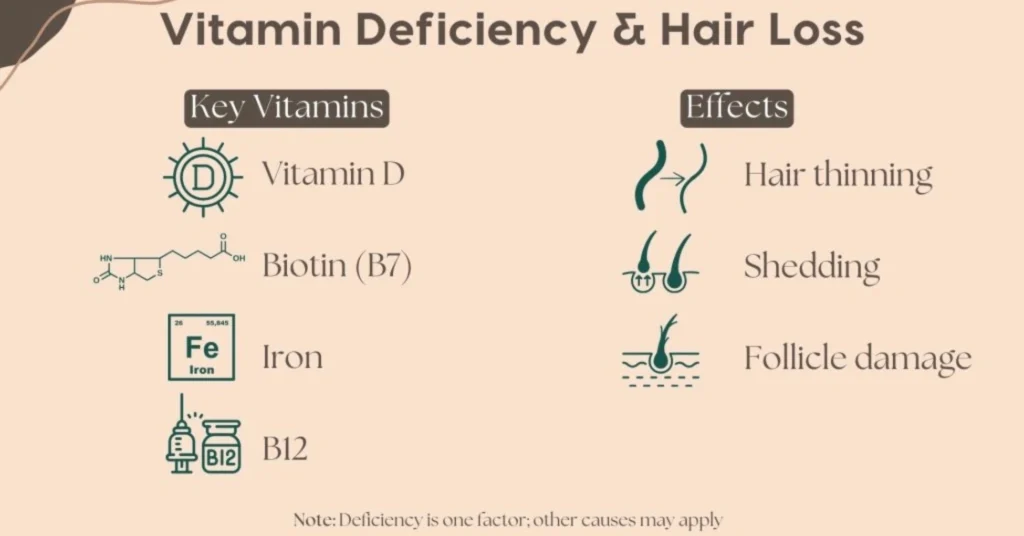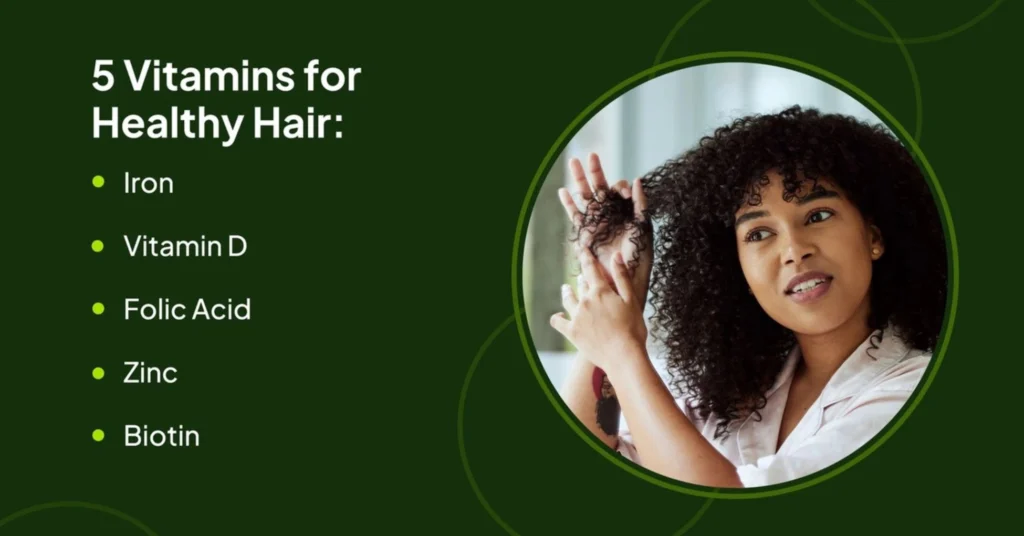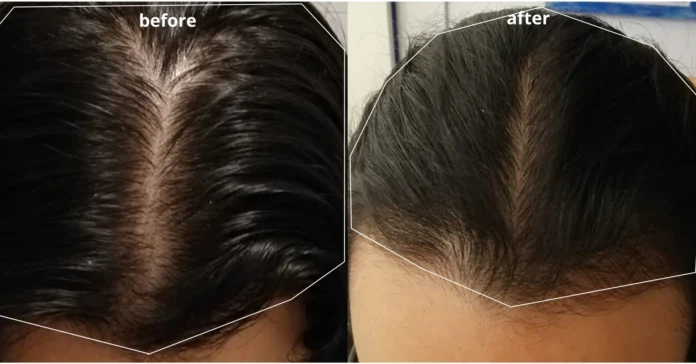Did you know that more than 50% of women will experience noticeable hair loss during their lifetime? Surprisingly, many cases of thinning hair might be connected to what’s missing from your plate rather than your genes.
The most common nutritional deficiency worldwide is iron deficiency, which frequently appears in women with hair loss. In fact, an estimated 40% of Americans are deficient in vitamin D, a crucial nutrient for creating the cells that develop into hair follicles.
When we talk about vitamins for hair growth, we’re addressing a real concern that affects millions. The female-pattern hair loss alone impacts about 30 million Americans. Specific vitamins like biotin, vitamin D, and vitamin E can significantly contribute to hair health, with vitamin E supplementation (100 milligrams) shown to increase total hair count.
For many of us struggling with thinning hair, understanding which hair growth supplements actually work can feel overwhelming. Throughout this article, we’ll explore the best vitamins for hair growth, how they support your hair’s structure, and practical ways to incorporate them into your daily routine for thicker, healthier locks.
Understanding Hair Thinning and Nutrient Deficiency

Hair thinning affects millions of people worldwide and often sneaks up gradually. Understanding the underlying causes can help us take the right steps toward healthier, thicker hair.
What causes hair to thin over time
Hair thinning stems from multiple factors working together. While genetics play a significant role in conditions like androgenetic alopecia (male or female pattern baldness), other influences include aging, hormonal fluctuations, stress, medical treatments, and underlying health conditions. Chronic stress raises cortisol levels, potentially triggering telogen effluvium—a condition where hair follicles enter an extended “resting” phase and new growth stalls.
Additionally, external factors like tight hairstyles, chemical processing, and certain medications can damage follicles over time. Furthermore, poor nutrition undermines hair health at its foundation, causing brittleness and accelerated shedding.
Can vitamin deficiency cause hair loss?
Absolutely. Research confirms that nutritional deficiencies often contribute to noticeable hair thinning and loss. Among the most common deficiencies linked to hair problems are iron, biotin, vitamin D, zinc, and protein.
The association between hair loss and low ferritin (iron storage) levels remains particularly significant, especially for menstruating women. Likewise, vitamin D deficiency has been connected to various forms of alopecia, including autoimmune-related hair loss.
Scientists have found that people experiencing hair thinning often show below-optimal levels of several key nutrients: biotin, zinc, iron, vitamin D, selenium, and essential fatty acids. Moreover, these deficiencies typically cause other symptoms like brittle nails, dry skin, fatigue, and reduced immune function.
How nutrients support hair structure and growth
Hair follicles depend on proper nutrition to function optimally. Your hair is primarily composed of a protein called keratin, which requires adequate dietary protein intake. Iron carries vital oxygen to follicles, enabling growth and regeneration. Without sufficient iron, follicles become oxygen-starved, leading to slower growth and increased shedding.
Vitamin C works as both an antioxidant and a collagen builder, minimizing inflammation that can inhibit hair growth. Zinc plays an essential role in hair follicle function and repair, while biotin (vitamin B7) contributes to keratin production—the fundamental protein making up hair structure.
Essential fatty acids, particularly omega-3s, help maintain scalp hydration and reduce inflammation that might otherwise interfere with healthy growth cycles.
Essential Vitamins for Hair Growth
The right vitamins can transform your hair health, acting as essential building blocks for stronger, thicker strands. Let’s explore the most effective vitamins that specifically target hair growth.
Biotin for hair growth and strength
Biotin (vitamin B7) plays a crucial role in hair health by supporting keratin production—the primary protein in hair. Although biotin deficiency is rare, it can cause hair thinning and loss. For people with self-perceived thinning hair, studies show that supplements containing biotin contributed to visible increases in overall hair volume and thickness after six months.
However, biotin supplements only effectively prevent hair loss in people with an existing deficiency. In one study, 38% of women complaining of hair loss had a biotin deficiency. The recommended biotin intake for addressing hair loss is approximately 3 milligrams (3,000 mcg) daily.
Vitamin D for hair loss prevention
Vitamin D is essential for creating the cells that develop into hair follicles. Research shows an inverse relationship between serum vitamin D levels and non-scarring alopecias such as telogen effluvium and androgenetic alopecia. Low vitamin D may be present in people with alopecia, though it’s not typically a common symptom of deficiency.
Vitamin D receptors found in hair follicle cells influence the growth and differentiation of hair follicle stem cells, affecting the hair growth cycle. Consequently, when vitamin D levels drop, it can disrupt this process and potentially lead to thinning hair.
Vitamin C for collagen and hair growth
Vitamin C plays a critical role in maintaining a normal mature collagen network, which is essential for hair structure. It acts as a cofactor that prevents auto-inactivation of key enzymes in collagen biosynthesis.
Furthermore, vitamin C enhances blood circulation to the hair follicles, ensuring they receive adequate nutrients and oxygen. Clinical studies show vitamin C improves hair density and reduces shedding when paired with collagen. Vitamin C also protects hair from oxidative stress caused by environmental factors like pollution and UV radiation.
Vitamin A for scalp health
Vitamin A affects hair health in a dose-dependent manner—both too much and too little can have negative effects. This vitamin helps regulate sebum production, keeping your scalp moisturized and preventing dryness. It also promotes cell turnover, essential for follicle health.
Nevertheless, excessive vitamin A can actually lead to hair loss by disrupting the natural growth cycle. The recommended daily allowance is 700 micrograms for women and 900 micrograms for men.
Vitamin E and its antioxidant role
Vitamin E functions as a powerful antioxidant that protects hair from damage caused by free radicals. It directly interacts with lipid free radicals, preventing oxidative stress that can damage hair follicles.
Studies show that vitamin E can reduce skin roughness and dehydration while protecting against UV damage. This vitamin may also help prevent premature aging of the scalp and expand capillaries to increase blood flow to follicles.
Vitamin B12 for hair strength
Vitamin B12 promotes healthy hair growth by supporting red blood cell formation. These red blood cells deliver oxygen to the living portion of hair strands, which is essential for sustaining growth. Without adequate oxygen, your hair typically cannot maintain healthy development.
Research indicates that correcting a vitamin B12 deficiency can help treat hair loss and stimulate growth, though the condition may become irreversible if deficiency causes permanent follicle damage. Common symptoms of B12 deficiency affecting hair include thinning, dry or brittle strands, unusual texture changes, and faster graying.
Important Minerals and Nutrients for Thicker Hair
Beyond vitamins, certain minerals and nutrients play fundamental roles in creating thicker, stronger hair. These elements work at the cellular level to support growth and repair.
Iron and its role in oxygen delivery to follicles
Iron deficiency stands as the world’s most common nutritional deficiency and appears frequently in women with hair loss. This mineral carries vital oxygen to hair follicles, with inadequate levels leading to oxygen-starved follicles that grow more slowly and shed prematurely. Studies show premenopausal women with female pattern hair loss have significantly lower serum ferritin than healthy controls. The daily recommendation is 8 mg for men and postmenopausal women but 18 mg for premenopausal women. read more about hair oils.
Zinc and its impact on hair repair
Zinc works as a potent inhibitor of hair follicle regression and accelerates recovery. Research reveals that hair loss patients typically have serum zinc levels approximately 13 μg/dl lower than those without hair loss. This mineral helps build hair protein structure, maintains follicles, and regulates hormones affecting hair loss. Adults need 8-11 mg daily for optimal hair health.
Magnesium for protein synthesis and hair shaft growth
Magnesium supports over 300 biochemical reactions, including protein synthesis essential for hair growth. It regulates calcium levels around follicles, preventing buildup that could block new growth. This mineral also aids in keratin production—hair’s primary structural component. Women need 310-320 mg daily while men require 400-420 mg.
Folic acid and keratin production
Folic acid (vitamin B9) plays a crucial role in regulating keratin production—hair’s main protein. It supports cell division and DNA synthesis, processes essential for the rapidly dividing cells in hair follicles. Deficiency may lead to thinning hair shafts and overall loss. The recommended daily intake is 400 mcg for adults.
Omega-3s and anti-inflammatory properties for hair
Omega-3 fatty acids provide anti-inflammatory benefits for the scalp, creating a healthier environment for hair growth. Studies indicate women taking fish oil supplements experienced increased hair growth and reduced loss. These fatty acids nourish follicles, promote circulation, and can make hair feel thicker. Nearly 90% of participants in one omega-3 supplement study reported thicker-feeling hair and reduced shedding.
How to Use Vitamins and Supplements Effectively

Taking supplements correctly can make all the difference between seeing results and wasting money. Understanding the right approach helps maximize benefits for your hair.
Best hair growth supplements to consider
Research-backed supplements like Viviscal Pro, Nutrafol, and Rogaine have proven effectiveness through clinical studies. Viviscal contains vitamin C and measured biotin amounts, whereas Nutrafol features anti-inflammatory ingredients like curcumin. For some, prenatal vitamins with folic acid can help combat hair loss. Multivitamins generally offer a safer alternative to single-nutrient supplements.
Foods rich in vitamins for hair
A balanced diet often provides all necessary nutrients without supplementation. For optimal hair health, focus on:
- Lean proteins (chicken, fish) for keratin production
- Omega-3 rich foods (salmon, walnuts, flaxseeds) for reducing inflammation
- Eggs for biotin
- Leafy greens for vitamins A and C
- Berries for antioxidants
How to use vitamins for hair regrowth
Different supplements require different dosages—some brands need four pills daily, others just one or two. Consider your lifestyle when choosing supplement forms. For best absorption, avoid consuming tea or coffee with iron supplements since tannins can inhibit uptake.
Risks of over-supplementation
Excessive supplementation can be harmful. Taking too much iron may cause poisoning, whereas biotin megadoses (10,000mg) can disrupt blood test results, particularly for cardiac and thyroid conditions. Excessive vitamin A can trigger hair loss instead of promoting growth.
When to consult a doctor for testing
Consult a doctor for blood tests if you suspect an underlying condition. Testing for ferritin levels helps identify iron deficiency—often missed in women. Thyroid function tests may reveal hormonal imbalances affecting hair health. Remember that supplements only help when you have a confirmed deficiency.
Conclusion
Achieving thicker, healthier hair requires understanding what your body truly needs. Throughout this article, we’ve seen how nutrient deficiencies significantly impact hair health, with iron and vitamin D deficiencies being particularly common culprits behind thinning hair.
Undoubtedly, vitamins play crucial roles in supporting hair structure and growth. Biotin strengthens keratin production, vitamin D activates hair follicles, while vitamin C promotes collagen formation. Additionally, vitamins A, E, and B12 contribute to scalp health, antioxidant protection, and oxygen delivery to follicles respectively.
Beyond vitamins, minerals like iron, zinc, and magnesium work as fundamental building blocks for hair growth. Iron delivers oxygen to follicles, zinc accelerates repair processes, and magnesium supports protein synthesis essential for developing strong hair shafts. Furthermore, nutrients such as folic acid and omega-3s enhance keratin production and reduce inflammation.
Most importantly, balance remains the key. Before starting any supplement regimen, consider whether your diet provides adequate nutrients through foods like eggs, leafy greens, fatty fish, and lean proteins. Though supplements can help address deficiencies, excessive amounts may actually harm your hair health rather than improve it.
If you’ve tried dietary changes and still struggle with thinning hair, consulting a healthcare professional for appropriate testing might reveal underlying deficiencies or conditions. Ultimately, the path to thicker hair combines proper nutrition, targeted supplementation when necessary, and professional guidance tailored to your unique needs.
FAQs
Q1. What are the most effective vitamins for promoting hair growth?
The most effective vitamins for hair growth include biotin, vitamin D, vitamin C, vitamin E, and vitamin B12. These vitamins support keratin production, activate hair follicles, promote collagen formation, provide antioxidant protection, and aid in oxygen delivery to follicles, respectively.
Q2. Can nutritional deficiencies cause hair thinning?
Yes, nutritional deficiencies can lead to hair thinning. Common deficiencies linked to hair loss include iron, biotin, vitamin D, zinc, and protein. These deficiencies can affect hair structure, growth cycles, and overall follicle health.
Q3. How do omega-3 fatty acids benefit hair health?
Omega-3 fatty acids provide anti-inflammatory benefits for the scalp, creating a healthier environment for hair growth. They nourish follicles, promote circulation, and can make hair feel thicker. Studies have shown that women taking fish oil supplements experienced increased hair growth and reduced hair loss.
Q4. Are there any risks associated with taking hair growth supplements?
Yes, there are risks associated with over-supplementation. Excessive iron intake can lead to poisoning, while high doses of biotin may interfere with certain blood test results. Taking too much vitamin A can actually trigger hair loss instead of promoting growth. It’s important to follow recommended dosages and consult a healthcare professional before starting any supplement regimen.
Q5. How long does it typically take to see results from hair growth vitamins?
The time frame for seeing results from hair growth vitamins can vary. Some studies have shown visible increases in hair volume and thickness after six months of consistent use. However, individual results may differ based on factors such as the specific deficiencies being addressed, overall health, and lifestyle habits. Patience and consistency are key when using hair growth supplements.






